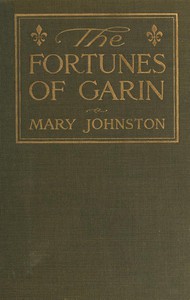The Fortunes of Garin by Mary Johnston (finding audrey TXT) 📗

- Author: Mary Johnston
Book online «The Fortunes of Garin by Mary Johnston (finding audrey TXT) 📗». Author Mary Johnston
Raimbaut the Six-fingered had for his fief been man of Montmaure, but for it Montmaure had been man of Roche-de-Frêne. Now, again, was it only Roche-de-Frêne’s. Montmaure might look blackly across from his own borders, but that was all.... It seemed that, escheating to the ruling house, the barony was not yet given, for service paid and to be paid, to some lord who should rebuild the castle and bring up the lands that now were waste.... Foulque had hours of speculation as to that. In the hall, of[372] evenings, he looked out of the corners of his eyes at Garin, reading or dreaming by the fire. Who had done greater service, fought better, than Garin? If the princess were truly wise—if she were grateful—
Foulque spoke once on this matter to Garin, but received so absolute a check that his tongue declined to bring it forward again. None the less, his brain kept revolving the notion. To add to Castel-Noir the whole containing fief, from knight alone to become baron, to keep the black tower but to build besides a fair, strong castle—Who at Roche-de-Frêne, or away from Roche-de-Frêne, had served more fully than had Garin? Foulque thought with a consuming impatience of how little he seemed to care for wealth and honours.
On the heel of such an hour as this with Foulque, came Aimar de Panemonde. He came with the sheen and beauty of the spring. Foulque saw him from the tower window as he left the fir wood and began to mount the winding road. Behind him were four or five others. All rode noble horses, all were richly clad. It came into Foulque’s head—from where he knew not—that here was an envoy with his company. The little troop seemed to him rich and significant, despatched with knowledge, directed to an end. At once Foulque connected that with Garin—and why again he knew not, save that, and despite his sluggishness in the matter of the fief, fairy things did happen to Garin.
[373]
Garin of the Golden Island met his brother-in-arms without the castle gate. Aimar threw himself from his horse. Foulque in the tower above watched the two embrace, then limped down the stair to meet the guest and order the household.... And soon it seemed that Sir Aimar de Panemonde might indeed be considered an envoy! The Princess of Roche-de-Frêne would have Sir Garin de Castel-Noir return to her court—commanded his presence on the day of Saint Mark.
There were three days to spare. Aimar, having discharged his mission, spent them happily, as did those who had ridden with him. Foulque made talk of the court and the town until—and that was not long—he found that, for some reason that he could not discern, Aimar did not talk readily of these. Ever Foulque wished guests of Castel-Noir to be happy, was courteously minded toward them. This one especially, seeing how great a friend to Garin he had been and was. So Foulque followed the lead of the younger men, and in the hall, after supper, had his reward in stories of the land over the sea—a thousand adventures not before drawn from Garin. Aimar’s followers and as many Castel-Noir men as could crowd into hall, came, too, to listen.
Three days went by. On the morning of the fourth farewells were made. Garin and Aimar passed out of the gate with their following and down the winding road. With Garin was Rainier the[374] squire, and two or three besides. Foulque and all who might watched them go, took the backward-turning wave of the knights’ hands, marked them until they vanished in the fir wood. Foulque went back to hall and began to day-dream of Garin and that fief had that been Raimbaut’s.
The two knights with their following rode through the spring weather. Very sweet it was, earth and sky more fair than might be told.... And so, in the early afternoon, they came in sight of Roche-de-Frêne.
It was holiday and festival. The people upon the road seemed light-hearted. The scarred plain had been helped, and now spring flung over it a mantle of green. When they came to the hill of Roche-de-Frêne the people had thickened about them; when they entered by the western gate the town seemed joyous. The folk were abroad and there was to be made out laughter and singing. As they rode through the streets they met again and yet again, and at last continually, recognition. It had a nature that might please the knightliest knight! The marvel of the cathedral rose before them, and the gold of the sunshine and the sweetness of the air took from it a shading of awfulness but gave in return benignancy. They mounted the high street, and now the mighty shape of the castle increased. Sunlight wrapped it, too, and above was the stair of the sky. Black Tower and Eagle Tower, Red Tower and Lion Tower and White Tower—and Garin saw the tree-tops of the garden.... They crossed the moat, entered[375] between Red Tower and Lion Tower. Trumpets were being sounded. Here, too, seemed festival. They dismounted in the outer court—men of rank came about them with the fairest welcome—they were marshalled soon to a rich lodging. Nones were ringing, the spring afternoon slipping away.
An hour passed, another was half run. Garin of the Golden Island, alone save for Rainier in the room that had been given him, heard the knock at the door. “Let him in,” he said to the squire, and Pierol entered. The page gave his message. “Sir Garin de Castel-Noir, the princess rests in the garden. She would speak with you there.” Garin took his mantle and followed.
In the castle garden the fruit trees were abloom. Their clear shadows lay on the sward while the shadows of the taller trees struck against the enclosing walls. Below the watch-tower there was a sheet of daffodils. The many birds of the garden were singing, and the bees yet hummed in the fruit trees. But there was no gay throng other than these, or other winged things, or the selves of the flowers.
It was quiet in the garden, and at first view it seemed a solitude. Then, as he came toward the heart of it, he saw the princess, seated beneath the great tree about which the garden was built. In the droop and sweep of its boughs had been placed a seat of marble finely wrought. Here she sat, robed in blue, and wearing, held in place by a circlet of gold, a veil threaded with gold and silver. But to-day it did not hide her face.
[376]
As he came near, “Greeting, friend!” she said, and her voice was thrilling music.
Garin would have bent his knee. But, “No!” she said, “do not do that! That is not to be done again between you and me.” She rose from the marble seat. She stood in flowing robes, on her head the gold circlet of sovereignty, and she looked a mighty princess, knowing her own mind, guiding her own action, freeing her own spirit, unlocking always new treasures of power and love! She came close to him, stood equal with him. Their eyes met, and if the princess sat in hers, the prince sat in his. “Do you know why I have brought you here?” she said: “I have brought you here, Garin of the Golden Island, to ask you if you will marry me?”
... In midsummer, on the Eve of Saint John, they were wed in the cathedral, with great music, pomp, and joy. Afterwards they knelt before the shrine of Our Lady of Roche-de-Frêne, and there were people who said that it was then that the Blessed Image’s lips moved and there issued the words “Peace and Happiness.” Going, the two passed the pillars raised by Gaucelm of the Star, and coming to the tomb of Gaucelm the Fortunate laid flowers there.... But when their own long reign closed, their land held them in memory as Audiart and Garin the Wise.
THE END
End of the Project Gutenberg EBook of The Fortunes of Garin, by Mary Johnston




Comments (0)